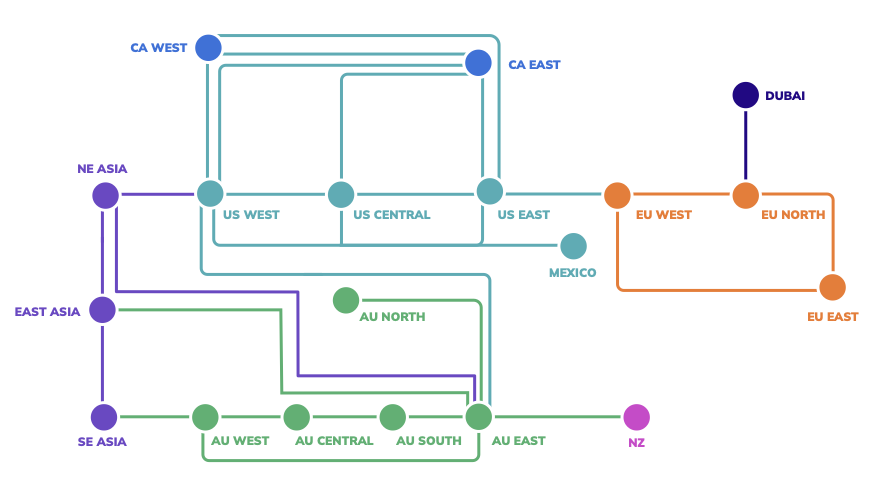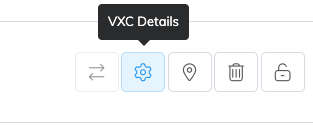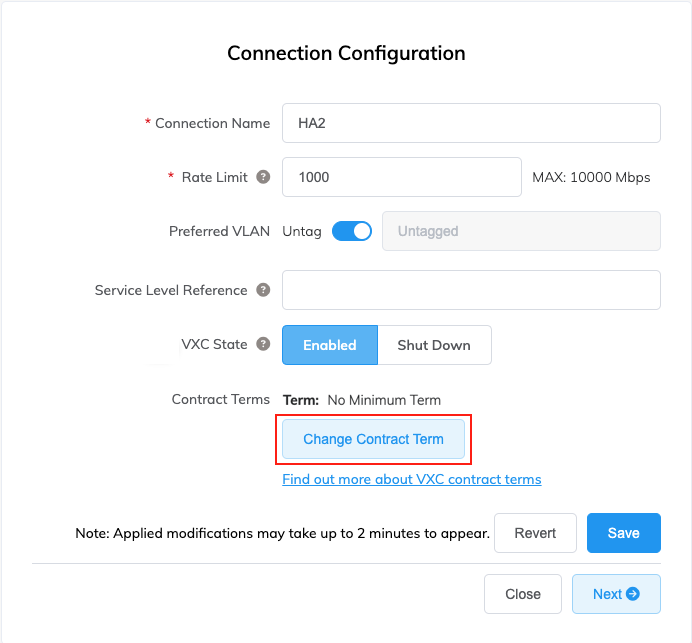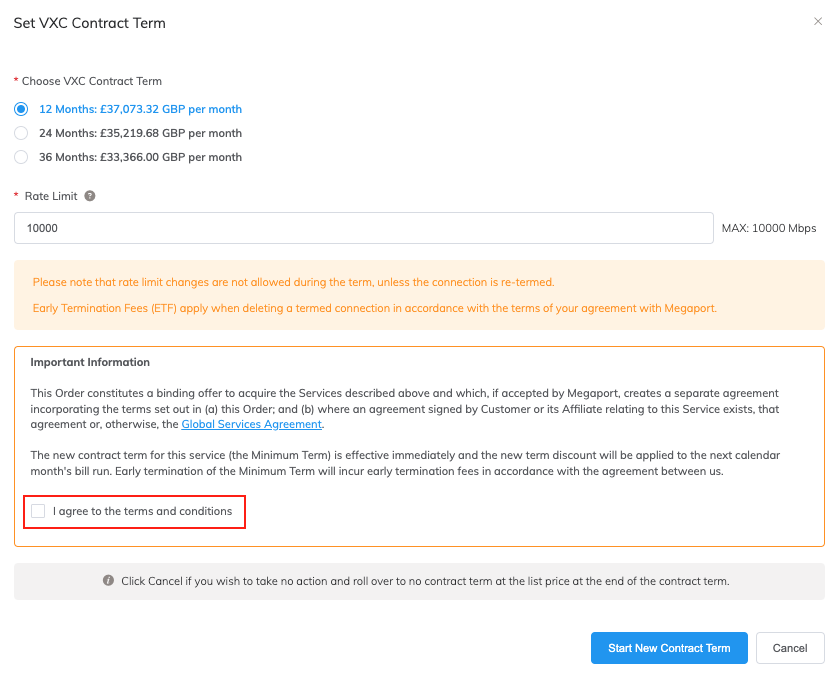VXC Pricing and Contract Terms
The key factors that determine VXC pricing are the distance between the locations (the A-End and B-End), the bandwidth that you configure, and the term that you choose.
There are three rate types based on distance:
-
Metro – A defined metropolitan area, usually a city or group of cities. A VXC connects two locations within the same city, such as:
- Two VXC located in San Francisco
- A VXC and a Cloud Service Provider (CSP), both located in London
-
Zone – A group of metro areas, typically multiple states or provinces. A VXC connects any two metros within the same zone, such as:
- Seattle and San Francisco (in the US West zone)
-
Interzone – Different cities in different zones. For example, an interzone VXC connects:
- A Port in US West and one in US East
- A Port in NE Asia and a CSP in AU North
Pricing zones and metros
| Pricing Zone | Indicative Metro |
|---|---|
| US West | Seattle, Reno, Los Angeles, Portland, Las Vegas, Phoenix, San Diego, Sacramento, Salt Lake City, Bay Area |
| US East | Ashburn, New York, Atlanta, Norwalk, Culpeper, Stamford, Miami, Boston, Philadelphia, Wise, Tampa, Pittsburgh, Orlando, Charlotte, Raleigh |
| US Central | Memphis, Grand Rapids, Detroit, Chicago, Dallas, Houston, Cincinnati, Austin, San Antonio, Denver, Kansas City, Columbus, St. Louis, Minneapolis, Nashville, Omaha |
| CA East | Toronto, Montreal, Quebec City, Ottawa |
| CA West | Calgary, Vancouver |
| Mexico | Mexico City, Querétaro |
| EU North | Brussels, Copenhagen, Rogaland, Luxembourg, Marseille, Amsterdam, Stockholm, Frankfurt, Berlin, Munich, Hamburg, Dusseldorf, Nuremberg, Helsinki, Oslo, Vienna, Geneva, Zurich, Warsaw, Paris, Madrid |
| EU West | Manchester, Edinburgh, London, Dublin, Birmingham |
| EU East | Sofia |
| Dubai | Dubai |
| AU Central | Adelaide |
| AU East | Wollongong, Sydney, Canberra |
| AU North | Brisbane |
| AU South | Melbourne |
| AU West | Perth |
| NZ | Auckland, Wellington, Hamilton |
| SE Asia | Singapore |
| East Asia | Hong Kong |
| NE Asia | Tokyo, Osaka |
This image shows the available zones in Megaport’s global network:

Note
For the most current location information, see the Megaport Locations page.
Contract terms
When you create a VXC, the Portal displays the monthly cost before tax on a Summary page before you confirm the order. The price is determined by the distance between the A-End and B-End locations, the bandwidth that you configure, and the term that you choose.
When you deploy a VXC, cost accrual begins immediately. In the Megaport Portal, you can make the following changes to pay-as-you-go or long-term contracts that are on standard pricing:
New VXCs
Select No Minimum Term to pay-as-you-go, or select a 12, 24, or 36-month term, billed monthly. The default term is 12 months. For more information on creating a VXC, see Creating a VXC.
Longer contract terms have these benefits:
-
Fixed monthly cost.
-
Discounts based on the term duration. Longer terms result in a lower monthly rate.
You can change the rate limit while the VXC is on a term.
Note
Partner and partner-managed accounts select VXC subscriptions instead of VXC contract terms.
Existing VXCs
In the Megaport Portal, you can make the following changes to a month-to-month or long-term contract:
- Add a 12, 24, or 36-month term to a month-to-month VXC on No Minimum Term.
- Extend a term on an existing contracted VXC.
- Increase or decrease the rate limit.
- Renew a term in the last month of a contracted VXC, before the term expires.
After making a term change, the Portal begins a new term on the next billing date.
Note
Each VXC in a Link Aggregation Group (LAG) is treated individually and is subject to the same contract term and billing agreements as an individual Port. For more information on LAGs, see Creating a Link Aggregation Group.
Note
Not all contract terms can be changed in the Portal. If an option is not available, it will be grayed out. Contact your Megaport Account Manager for more information.
-
Existing VXCs on a minimum term – You can renew a 12, 24, or 36-month term, or extend to a longer term. You can extend a minimum term at any time.
If you prefer not to renew, no action is required. At the end of the term, the contract will automatically roll over to pay-as-you-go billing at the current rack rate (standard pricing, without term discounts). For more information on changing a term, see Changing a contract term.
-
Existing month-to-month VXC – Upgrade a VXC on No Minimum Term to a 12, 24, or 36-month contract term, at any time.
-
Expired VXC terms – Renew a term contract after it has expired. After a VXC term expires, the monthly rate reverts to the standard rates.
Note
To provide adequate time for you to extend or renew the VXC, Megaport will notify you via email one month ahead of term expiration. For Link Aggregation Groups (LAGs), each VXC in the LAG is treated individually. Megaport will send a separate renewal email for each Port.
Changing a contract term
Use these instructions to help you change your contract term.
Tip
To change the VXC speed, you can increase or decrease the rate limit during a term without needing to re-term. For more information, see Changing the Speed of a Termed VXC.
To change a contract term
-
In the Megaport Portal, go to the Services page and locate the VXC you want to change.
-
Click the VXC Details icon.

-
Review the contract term details for the VXC.
The Contract Terms field shows the current term details for the VXC.

-
Click Change Contract Term and select the new term for the VXC.
-
Choose VXC Contract Term – Select 12 Months, 24 Months, or 36 Months. VXCs that are under a contract term or on No Minimum Term start their new contract term immediately.
When you re-term a VXC, you can optionally increase the rate limit.

-
-
Select the I agree to the terms and conditions check box to indicate you have read and agreed to the Global Services Agreement.
-
Click Start New Contract Term.
Alternatively, click Cancel to maintain the current term conditions for the VXC.
VXCs on No Minimum Term will continue to be billed on a pay-as-you-go basis.
If a termed VXC expires, it will roll over to No Minimum Term. The term discount will no longer be applied and the rate limit will be editable.
The Portal accepts the new term at the current standard rate and will apply any applicable term discounts at the new term start date. The new Term details are shown on the VXC Connection Configuration page.
See also VXC, Megaport Internet, and IX Billing.
Changing the speed of a termed VXC
You can increase and decrease the speed of a termed VXC. For more information, see Changing the Speed of a Termed VXC.
Pricing estimates
You can obtain a VXC price estimate as follows:
-
Megaport Quoting Tool – Quickly create a quote to estimate the cost of deploying VXCs, before ordering the services. Entering details into the Quoting Tool helps you plan the overall cost of Megaport services. This provides a clear idea of the design, services needed, and cost breakdown for planning.
For more information, see Quoting Service Cost. -
Megaport Portal – Test different VXC configurations without any obligation. Create a VXC to see how metros, zones, interzones, and data centers are priced. Create a VXC to get an immediate estimate in your currency before you deploy.
Note
By default, partner-managed accounts do not display pricing details. Discuss pricing directly with your partner.
How does billing work?
Metro VXCs are billed a recurring monthly flat fee based on these bandwidth tiers:
- 1 Mbps to 1 Gbps
- 1001 Mbps to 10 Gbps
- 10001 Mbps to 50 Gbps
- 50001 Mbps to 100 Gbps
Zone and interzone VXCs are priced using two components:
- A recurring fixed fee.
- Bandwidth-based rate (priced per Mbps per month).
This rate is based on the time a VXC is active at a defined speed and bandwidth.
Note
Megaport applies surcharges to cloud on-ramp VXCs with a B-End connecting to Alibaba, Amazon Web Services (AWS), AWS Hosted Connections (AWSHC), Azure, Google, Oracle, SFDC, Outscale, IBM, Nutanix, and GCI for these VXC types:
- VXCs connecting two ends in the same metro area
- VXCs connecting two ends in different metro areas
Note
Megaport applies a surcharge based on the selected rate limit for any VXCs with a B-End connecting to France-IX.
See also VXC, Megaport Internet, and IX Billing.
Cancellation
You can cancel a VXC at any time. Canceling a VXC on a contract term will result in an early termination fee (ETF) equivalent to 100% of the remainder of the term. For more information, see Terminating a VXC.